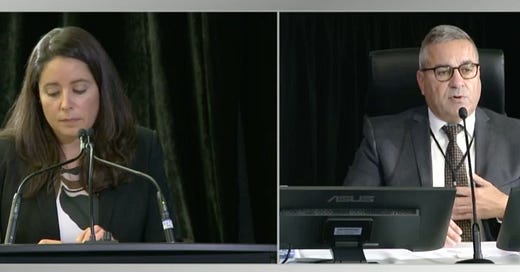
As a warm-up act for one of the main attractions at the big convoy commission down on Wellington Street, you could do worse than Steve Kanellakos and Serge Arpin.
First because the two Ottawa municipal officials have clout: Kanellakos is the city manager, essentially its top-ranking bureaucrat, and Arpin is the mayor’s chief of staff, Jim Watson’s political right hand for as long as Watson has needed one. Watson will testify on Tuesday about what it was like to be mayor in a G7 capital that had lost control of its downtown. Kanellakos and Arpin testified first, to provide valuable context and background as they described their own roles during February’s surreal Freedom Convoy blockade.
Kanellakos and Arpin also happen to cut contrasting figures. Kanellakos is blocky and prosaic. For most of his half-day under oath he kept his hands folded on the desktop in front of him and seemed immobile except for his jaw and his eyebrows. When one of the lawyers interrogating him asked a question using any kind of dramatic language, Kanellakos’ first gambit was usually to challenge the basis for such hyperbole.
Arpin is slim, elegant, well-tailored, soft-spoken. People in Ottawa have long known this façade presents an accurate but incomplete portrait, because if Jim Watson needs somebody to be tough on his behalf, Arpin does not hesitate. And the long record of correspondence with federal political staffers that formed the textual basis of his testimony showed that Arpin was also not reluctant to blow his stack if need be. In February he was often sensing the need.
On Feb. 11 Arpin was texting with Mike Jones, Marco Mendicino’s chief of staff, about police reinforcements — more on that in a minute, boy howdy — when Arpin decided he’d had enough of gentle federal encouragement to continue back-channel negotiations with representatives of the convoy leadership.
Arpin detected a whiff of hypocrisy — whether coming from Jones or simply hanging in the air is hard to tell, since reporters don’t have access to most of the commission’s documentation and must simply grab screenshots as individual pages come up. As is often the case, Arpin wasn’t shy about expressing his concern.
“I assume that you must understand how spectacularly ridiculous the contention is that we could be meeting with them [the convoy] when your level of government trots out a number of ministers to denigrate the demonstrators and let them know that dialogue is impossible with the Government of Canada in the context of a demonstration targeting the government of Canada but somehow we should divine that we should be meeting with them to make them feel heard,” Arpin typed on his tiny virtual keyboard, with what one can only assume were thumbs calloused by long use to a flinty polish. “That’s nauseating to say the least.”
This sense of being used — of doing the hard and morally precarious work of negotiating with strangers while the swells up the hill postured — was only one piece of the compound loneliness Kanellakos and Arpin described for Justice Paul Rouleau, the inquiry commissioner.
Their own municipal police force had given them terrible counsel ahead of the mess. Ontario’s premier had washed his hands of the whole business, and not for the first time or last, of the Ontario municipality of Ottawa in general. And Justin Trudeau’s federal government, theoretically a close neighbour in terms of both geography and ideology, was so busy fighting grandiose fantasies it was not much help at all in addressing actual problems in the present world.



